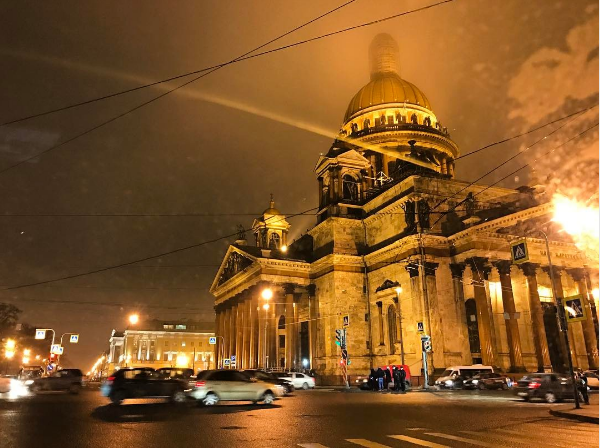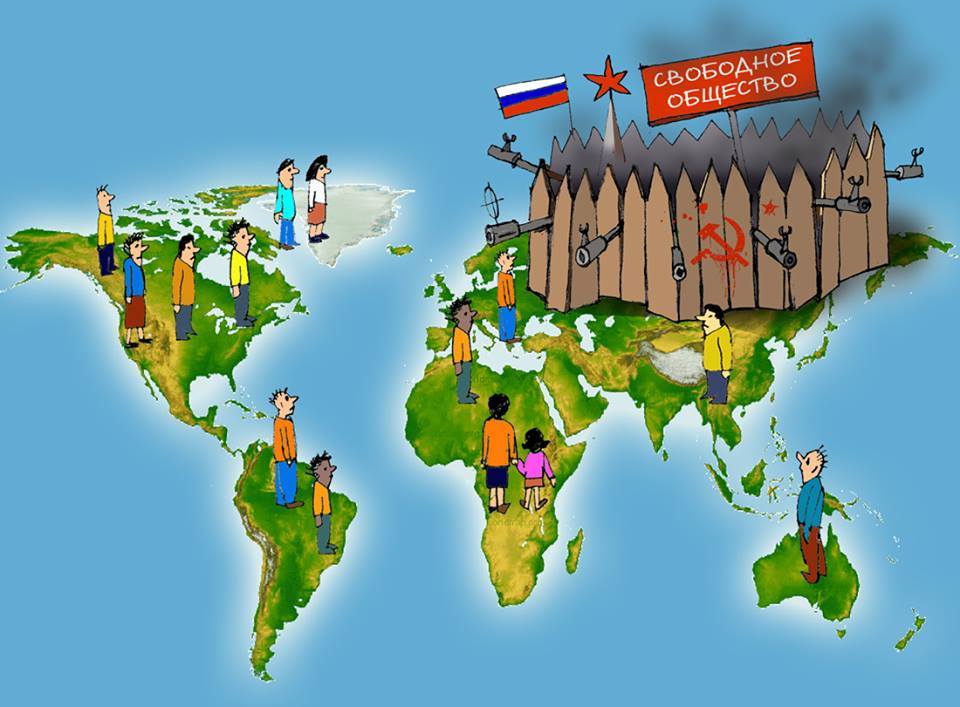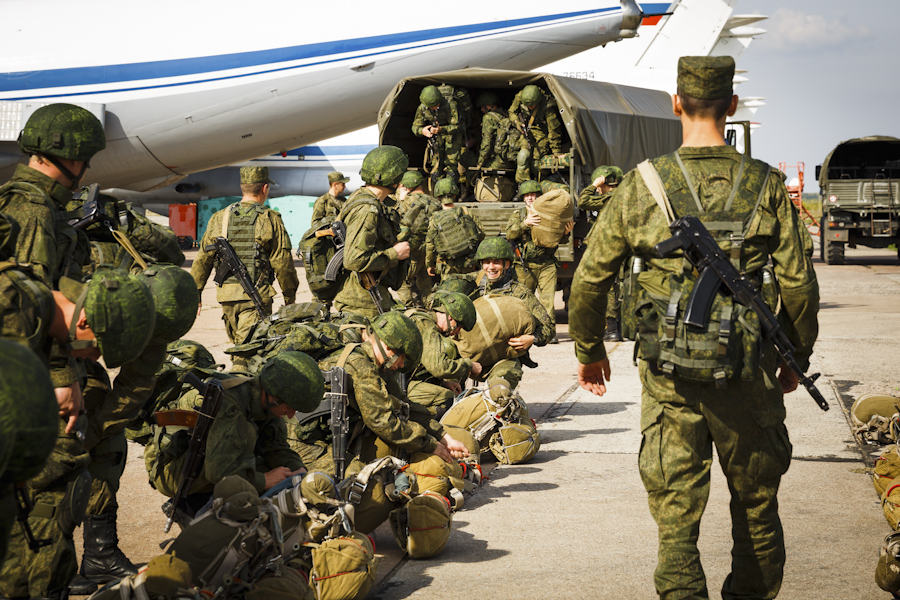Even as Vladimir Putin claims that Russia is fated to have a great future, the Kremlin leader is doing little to end the impoverishment and repressions of Russians today and ever more to restore many of the worst features of the dark Soviet past. This week has brought five more examples of that retrograde trend.
1. Orwellian "Newspeak" in Russian Legal Practice
Orwellian newspeak is returning to Russian legal practice at alarming rates. Asked by the regional news portal 7x7 to comment on the increasing use by officials of terms like “pseudo-religious,” “destructive organizations,” and “anti-social groups, SOVA Center director Aleksandr Verkhovsky said this is extremely dangerous.
“There is no legal definition” of such terms and consequently they represent an attempt to expand by analogy, a favored tactic of Soviet practice, terms that do exist like “extremist organizations.” And that means, the rights activist says, that “an official can choose” as a target “anyone who doesn't fit his taste.”
“This is newspeak,” Verkhovsky says, using the term George Orwell introduced in his novel “1984
” about totalitarian systems. And while such terms may have utility in pointing to problem areas at the level of informal discussions, their use as legal categories is “bad and often dangerous.”
2. Lines Are Back
Lines, the bane of the existence of Soviet-era Russians, are returning to Putin’s Russia even though no one is supposed to talk about this. Russian blogger Nikolay Yurenev says that “everyone says that under Putin there are no lines in the stores” but everyone knows that isn't true.
Not only lines have returned but what might be called the political culture of lines has returned as well, with people standing in line for hours cursing their existence but then going home, watching Moscow television, and concluding that as bad as things may be for them, they are far worse in the hated West which they are told to blame for their problems.
Yurenev gives the following example: “In one almost million-peopled city of N, in one meat store, there is a line” every Monday, Wednesday and Friday when meat goes on sale for less than the usual price, and the line, he says, snakes around the block from the time the store opens until it closes.
Even before the store opens, the line begins to form with “unemployed patriots and pensioners who form a good half of the population of the city of N” being the predominant element in it. And the entire line, despite the wait and the cold, “fraternally supports the wise policy of the outstanding political and government leader, the flaming battler for peace in the entire world, Vladimir Vladimirovich Putin.”
Those standing in line “express their unlimited trust and deep gratitude for his unceasing concern about the well-being of the people and the flourishing of the Great Fatherland,” Yurenev continues. Those who succeed in reaching the head of the line then return home to prepare dinner and watch Moscow television.
It is then that their participation in “big politics” becomes clear, the Russian blogger continues. They learn how Ukraine and the West are to blame for their small pensions and “how in the US, the enemies of Trump are seeking to derail his friendly policy toward Russia and toward Putin personally.”
“How awful to live in this insane, insane, insane foreign world,” they say “in their hearts” and “how beautiful things are in our Fatherland.” In that world, lines for inexpensive meat are no problem at all: they are an indication of just how good Russians have it under the wise leadership of Putin.
3. Fictional Support of Government Actions by Population
Russian officials are justifying what they want to do by saying that the population is demanding such actions whether or not that is true. TASS, as the Russian news agency is again called, just as it was in Soviet times, reports that the culture ministry welcomes the calls by Russian activists to create a Day of Patriotism
.
In the USSR, officials often declared they were taking this or that action because “the workers and peasants” were demanding it. Now, Moscow is using the same tactic, saying that the population wants such a holiday and to have it timed to coincide with the imposition of sanctions or perhaps counter-sanctions, even though the latter are preventing food from getting to them.
4. Falsified Signatures on Public Documents
Russian officials are claiming that people who never signed or even saw a document signed it, if it is the kind of document the regime wants. Earlier this week, supporters of handing over St. Isaac’s Cathedral to the Russian Orthodox Church put out what they said was a call by 26 rectors of higher educational institutions backing that step.

But now it turns out that was “fake news” or perhaps “an alternative fact” because two of the rectors whose signatures are listed say they did not sign the document and one declared that he hadn't even heard about plans for one.
In Soviet times, communist party officials often put down the names of people without asking their permission or agreement in order to boost the official line. The big difference now is that some who are victims of this practice are complaining, although whether that will be career-enhancing remains to be seen.
5. Important Witnesses of Putin's War Crimes In Ukraine Being Assassinated
And fifth and most ominously, Putin is getting rid of the witnesses of his own crimes in Ukraine. Zoryan Shkiryak, an advisor to the Ukrainian interior minister, says that the murder of pro-Moscow warlord that went under nom de guerre Givi
is only the latest example of something Kyiv has been warning about for the last two years.

“Putin,” he points out, “is consistently destroying especially important witnesses of his own military crimes” in Ukraine, a program that he launched after the shooting down of the Malaysian passenger jet MH-17 but that has affected participants in his “terrorist” actions in Mariupol, Volnovakha and Debaltseve as well.
In the case of “the liquidation of Givi,” Shkiryak continues, Moscow clearly controls all of the participants in this action, and thus no one would have acted without the blessing or more likely the direct order of the Russian authorities in the Russian capital.
Such things are no oddities or innovations, he says. They “are in the best traditions of the Russian special services” and are indeed “all links in a single chain.”
Related:
- Another warlord killed: Mystery grows as series of deaths in Russian-backed enclaves continues
- Why are the "heroes of the Russian Spring" blowing up?
- Mariupol to world: how much more blood must be shed to stop the aggressor?
- Anti-Volnovakha. Horrible killing of civilians by Russian terrorists in Donetsk
- Pocket Vocabulary of Kremlin-speak
- A guide to Putin's 2015 Q&A press conference newspeak
- Russian oppositioner: 'Zombification of society keeps Putin in power but will destroy Russia'





